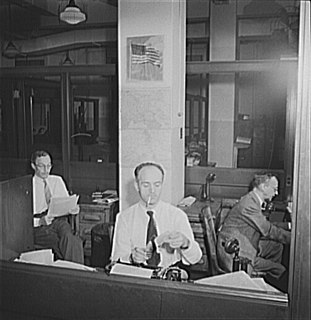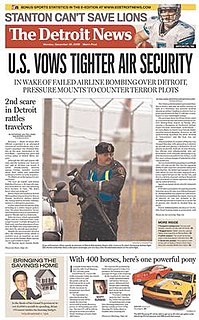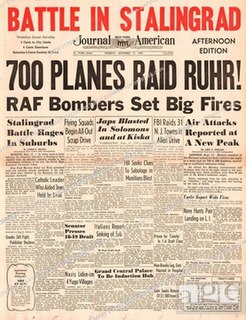Related Research Articles

The Boston Herald is an American conservative daily newspaper whose primary market is Boston, Massachusetts and its surrounding area. It was founded in 1846 and is one of the oldest daily newspapers in the United States. It has been awarded eight Pulitzer Prizes in its history, including four for editorial writing and three for photography before it was converted to tabloid format in 1981. The Herald was named one of the "10 Newspapers That 'Do It Right'" in 2012 by Editor & Publisher.

William Randolph Hearst Sr. was an American businessman, newspaper publisher, and politician known for developing the nation's largest newspaper chain and media company, Hearst Communications. His flamboyant methods of yellow journalism influenced the nation's popular media by emphasizing sensationalism and human interest stories. Hearst entered the publishing business in 1887 with Mitchell Trubitt after being given control of The San Francisco Examiner by his wealthy father, Senator George Hearst.
Yellow journalism and yellow press are American terms for journalism and associated newspapers that present little or no legitimate, well-researched news while instead using eye-catching headlines for increased sales. Techniques may include exaggerations of news events, scandal-mongering, or sensationalism. By extension, the term yellow journalism is used today as a pejorative to decry any journalism that treats news in an unprofessional or unethical fashion.

The Marihuana Tax Act of 1937, Pub.L. 75–238, 50 Stat. 551, enacted August 2, 1937, was a United States Act that placed a tax on the sale of cannabis. The H.R. 6385 act was drafted by Harry Anslinger and introduced by Rep. Robert L. Doughton of North Carolina, on April 14, 1937. The Seventy-fifth United States Congress held hearings on April 27, 28, 29th, 30th, and May 4, 1937. Upon the congressional hearings confirmation, the H.R. 6385 act was redrafted as H.R. 6906 and introduced with House Report 792. The Act is now commonly referred to, using the modern spelling, as the 1937 Marijuana Tax Act. This act was overturned in 1969 in Leary v. United States, and was repealed by Congress the next year.

Joseph Henry Simon was an American comic book writer, artist, editor, and publisher. Simon created or co-created many important characters in the 1930s–1940s Golden Age of Comic Books and served as the first editor of Timely Comics, the company that would evolve into Marvel Comics.

Print syndication distributes news articles, columns, political cartoons, comic strips and other features to newspapers, magazines and websites. The syndicates offer reprint rights and grant permissions to other parties for republishing content of which they own and/or represent copyrights. Other terms for the service include a newspaper syndicate, a press syndicate, and a feature syndicate.

The New York Herald Tribune was a newspaper published between 1924 and 1966. It was created in 1924 when Ogden Mills Reid of the New-York Tribune acquired the New York Herald. It was widely regarded as a "writer's newspaper" and competed with The New York Times in the daily morning market. The paper won twelve Pulitzer Prizes during its lifetime.

The Seattle Post-Intelligencer is an online newspaper and former print newspaper based in Seattle, Washington, United States.

The Detroit News is one of the two major newspapers in the U.S. city of Detroit, Michigan. The paper began in 1873, when it rented space in the rival Detroit Free Press's building. The News absorbed the Detroit Tribune on February 1, 1919, the Detroit Journal on July 21, 1922, and on November 7, 1960, it bought and closed the faltering Detroit Times. However, it retained the Times' building, which it used as a printing plant until 1975, when a new facility opened in Sterling Heights. The Times building was demolished in 1978. The street in downtown Detroit where the Times building once stood is still called "Times Square." The Evening News Association, owner of The News, merged with Gannett in 1985.

King Features Syndicate, Inc., is a content distribution, consumer product licensing and print syndication company owned by Hearst Communications that distributes about 150 comic strips, newspaper columns, editorial cartoons, puzzles, and games to nearly 5,000 newspapers worldwide. King Features Syndicate also produces intellectual properties, develops new content and franchises, like Cuphead, which it produced with Netflix, and licenses its classic characters and properties. King Features Syndicate is a unit of Hearst Holdings, Inc., which combines the Hearst Corporation's cable-network partnerships, television programming and distribution activities, and syndication companies. King Features' affiliate syndicates are North America Syndicate and Cowles Syndicate.

The New York Journal-American was a daily newspaper published in New York City from 1937 to 1966. The Journal-American was the product of a merger between two New York newspapers owned by William Randolph Hearst: The New York American, a morning paper, and the New York Evening Journal, an afternoon paper. Both were published by Hearst from 1895 to 1937. The American and Evening Journal merged in 1937.

The Milwaukee Journal Sentinel is a daily morning broadsheet printed in Milwaukee, Wisconsin, where it is the primary newspaper. It is also the largest newspaper in the state of Wisconsin, where it is widely distributed. It is currently owned by the Gannett Company.
Frank Ernest Gannett was an American publisher who founded the media corporation Gannett Company. He began his career in 1906 as half owner of the Elmira Gazette. He soon added newspapers in Ithaca, Rochester, Utica, and other cities in upstate New York. At the time of his death, the chain included 22 daily newspapers, four radio stations, and three television stations, largely based in the state of New York.

Arthur Brisbane was one of the best known American newspaper editors of the 20th century as well as a real estate investor. He was also a speech writer, orator, and public relations professional who coached many famous businesspeople of his time in the field of public relations, particularly Henry Ford, Thomas Edison and John D. Rockefeller.
Lloyd Victor Jacquet was the founder of Funnies, Inc., one of the first and most prominent of a handful of comic book "packagers" established in the late 1930s that created comics on demand for publishers testing the waters of the emerging medium. Among its other achievements, Funnies, Inc. supplied the contents of Marvel Comics #1, the first publication of the company that would evolve into Marvel Comics. Characters created by Jacquet's company include the Sub-Mariner and the original Golden Age Human Torch.

The history of American newspapers begins in the early 18th century with the publication of the first colonial newspapers. American newspapers began as modest affairs—a sideline for printers. They became a political force in the campaign for American independence. Following independence the first amendment to U.S. Constitution guaranteed freedom of the press. The U.S. Postal Service Act of 1792 provided substantial subsidies: Newspapers were delivered up to 100 miles for a penny and beyond for 1.5 cents, when first class postage ranged from six cents to a quarter.
Archie Hayes Merrill was an American journalist, author, and poet sometimes called the "Poet Laureate of Upstate New York".
The Lawrence Journal-World is a daily newspaper published in Lawrence, Kansas, United States, by Ogden Newspapers.
The San Francisco Examiner is a newspaper distributed in and around San Francisco, California, and published since 1863.

The 1936 Seattle Post-Intelligencer Strike was a labor strike that took place between August 19 and November 29, 1936. It started as the result of two senior staff members being fired after forming an alliance and joining The Newspaper Guild. The strike halted production of the newspaper for the duration of the strike. The strike ended with a formal recognition of The Newspaper Guild.
References
- ↑ Scribner, John. "The News Writers Form a Union", The Nation , June 20, 1934. Accessed January 20, 2001. WebCitation archive.
- ↑ Lyon, Norman T. (1935). History of the Polish People in Rochester. Part 1 of online version at On-line Books of Monroe County, New York website. Archived from the original on July 14, 2011. Additional WebCitation archive.
- ↑ "Archie Hayes Merrill papers, 1837-1972" (PDF). Hobart and William Smith Colleges . Retrieved 18 March 2013.
- ↑ Hughes, James P. "Down-Home Bard: Finger Lakes Great Arch Merrill", Life in the Finger Lakes magazine, Winter 2008. Accessed January 20, 2001. WebCitation archive.
- ↑ Simon, Joe, with Jim Simon. The Comic Book Makers (Crestwood/II, 1990) ISBN 1-887591-35-4, pp. 26-27
- ↑ Simon, The Comic Book Makers, p. 28